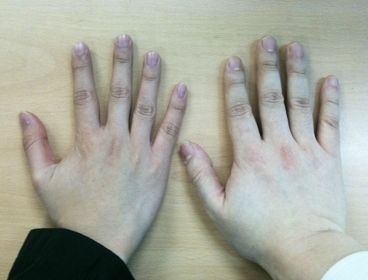PARIS, (AFP) - The longer a man's fourth or ring finger is compared to his index finger, the more likely he is to be judged attractive by women, according to a study released Wednesday.
The results, published in the British Royal Society's journal Biological Sciences, unveil intricate links between foetal exposure of males to hormones, the development of certain physical traits, and what turns on the opposite sex.
It also adds to a growing body of research -- conducted under the banner of evolutionary psychology -- suggesting that the drivers of human behaviour are found, more than previously suspected, in "nature" rather than "nurture."
Earlier studies had already shown that the size ratio between the fourth and second fingers, especially of the right hand, is a reliable indicator of the extent a man was exposed to testosterone while still in the womb.
The bigger the gap between a longer ring finger and a shorter index, the greater the likely impact of the hormone.
For the new study, scientists led by Camille Ferdenzi of the University of Geneva designed an experiment to find out if women are drawn to the telltale signs of high testosterone levels in men -- a symmetrical face, a deeper voice, a particular body odour -- who have this more "masculine" finger configuration.
More than 80 women university students between 18 and 34 looked at pictures of 49 similarly aged men, and were asked to evaluate them for masculinity and attractiveness.
Smaller groups of women listened to recordings of the male voices, and smelled samples of their body odour, taken from cotton pads worn under the arm for 24 hours.
"The aim was to understand what makes a man attractive," and whether at least some of those qualities "were in part conditioned by the foetal environment," Ferdenzi said in an interview.
For the visual test, the results were unambiguous. "The longer the ring finger compared to the index -- that is, the greater the exposure to testosterone -- the more attractive the face was rated," she said by phone.
"We also found that attractiveness and symmetry in the face are highly correlated."
Such a preference might have evolved to boost a female's chances of reproductive success through mating with a more virile partner, she said.
Surprisingly, however, women did not consistently tag the same men as "masculine".
Nor did their preferences for voice or odours correspond to the longer ring-finger males.
"There wasn't any relation between the 2D-4D" -- 2nd digit, 4th digit -- "ratio and the reactions of the women to odour," Ferdenzi said.
One reason, she speculated, may be that voice and body odour are more dependent on fluctuating levels of adult testosterone than on pre-natal testosterone.
The ring-index finger ratio has also proven to be a useful indicator for gauging the risk of prostate cancer, likewise tied to high levels of testosterone.
Research published in December showed that the chances of developing the disease drop by a third in men whose index finger is longer than their ring finger.
Other studies have also found a link between exposure to hormones before birth and the development of other diseases, including breast cancer and osteoarthritis.
<한글 요약>
여성은 약지가 긴 남성에게 호감 느껴
남자의 약지(네 번째 손가락)가 검지보다 길수록 여성들이 호감을 가지는 것으로 나타났다.
영국의 브리티시 로열 소사이어티에서 발간한 저널 '바이오로지컬 사이언스'에서 발표된 이 연구 결과는 태아기의 호르몬 노출 여부, 특정 신체적 특성의 발전, 그리고 이성을 끄는 매력의 연관성을 밝혔다.
이 연구는 인간의 행동은 후천적인 것보다 자연적인 것에 의해 더 많은 영향을 받는다고 말한다. 이전의 연구들에서는 이미 검지와 약지의 길이 차이가 자궁에서의 테스토스테론(남성 호르몬) 노출 빈도를 보여주는 척도라고 밝혀진 바 있다. 검지와 약지의 차이가 클수록 남성 호르몬의 영향을 더 많이 받은 것으로 드러났다.
이 연구를 주도한 제네바 대학의 연구진은 여성이 남성의 테스토스테론의 정도에 얼마나 민감히 반응하는 지를 실험했다. 18세에서 34세 사이의 80여명의 여대생들은 49명의 비슷한 나이의 남성들의 사진을 보고 그들의 남성성과 호감도에 대해 평가를 매겼다. 결과는 약지가 검지보다 길수록, 즉 테스토스테론에 노출빈도가 더 높을 수록, 여성은 남성의 외모에 더 호감을 느낀다는 것이었다.
또한 얼굴이 대칭일수록 호감도가 높아지는 것으로 나타났다.







![[Today’s K-pop] Blackpink’s Jennie, Lisa invited to Coachella as solo acts](http://res.heraldm.com/phpwas/restmb_idxmake.php?idx=644&simg=/content/image/2024/11/21/20241121050099_0.jpg)
